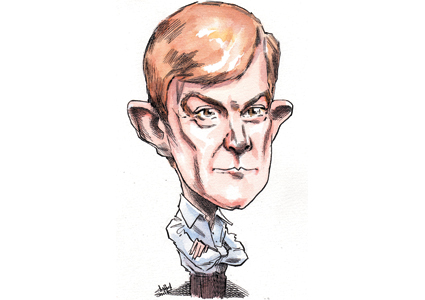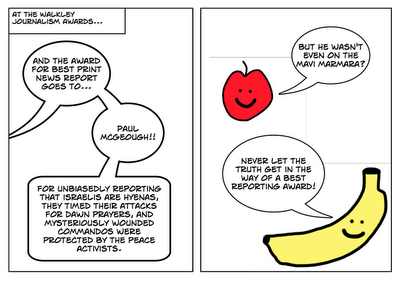This was written by Michael Mosbacher, the managing editor of Standpoint. The essay is cross-posted here with their expressed permission.
Writing in the Guardian in the aftermath of the riots Seumas Milne was one of the few voices offering a justification for looting: “While bankers have publicly looted the country’s wealth and got away with it, it’s not hard to see how those who are locked out of the gravy train might think they were entitled to help themselves to a mobile phone.”
Imagine that the Daily Mail or Telegraph had appointed as Comment Editor someone who had been the business manager of a factional British National Party publication whose raison d’être was to attack its leader Nick Griffin for having sold out “white nationalism”. Imagine too that this editor would specialise in pieces justifying the crimes of the Nazis and arguing that — while he had made mistakes — there was much for which to be grateful to Hitler. To even think of such a possibility is to realise that it could simply never happen. Yet Seumas Milne’s position is the far-Left mirror of this far-Right scenario.
He was born in 1958, the son of Alasdair Milne, then a BBC producer and later Director-General until sacked in 1987 at Margaret Thatcher’s behest for his alleged left-wing bias. Seumas was sent to Winchester and then read PPE at Balliol College, Oxford. With such a background, he naturally progressed to become business manager of a Communist Party publication, Straight Left, which claimed simply to be a weekly paper aimed at the “wider labour movement”. It was in fact a faction within the CP aiming to keep it on a solidly Stalinist path. Its main comment piece was always signed Harry Steel, a nom de plume in homage of its heroes: Harry Pollitt, the party’s Stalin-era General Secretary, and the Man of Steel himself.
Milne became a reporter and then Labour Editor at the Guardian, writing a book, The Enemy Within: Thatcher’s Secret War against the Miners, on dirty tricks by MI5 against the National Union of Mineworkers and Arthur Scargill. He was the Guardian‘s Comment Editor from 2001 to 2007 and is now a columnist and Associate Editor.
One might forgive Milne’s youthful Stalinism if he had moved on — but the evidence suggests the reverse. In 2002 Martin Amis published Koba the Dread, on why a generation of Western intellectuals contrived to whitewash Stalin’s crimes. Milne’s response: “Amis’s book is in reality only the latest contribution to the rewriting of history that began in the dying days of the Soviet Union and has intensified since its collapse…the number of victims of Stalin’s terror has been progressively inflated over recent years.” What so appals Milne is that anyone might speak of Stalin in the same terms as Hitler. While he acknowledges that Stalin made mistakes and indeed that 799,455 people were executed between 1921 and 1953, these must be judged against Uncle Joe’s many achievements. His crimes are nothing, argues Milne, compared to those of European colonialism: “If Lenin and Stalin are regarded as having killed those who died of hunger in the famines of the 1920s and 1930s, then Churchill is certainly responsible for the four million deaths in the avoidable Bengal famine of 1943.”
Milne was so proud of his 2002 review that he repeated the same arguments, indeed repeated whole chunks word for word, in another Guardian piece in 2006. This time those he accused of distorting history were Jung Chang and Jon Halliday for their critically-acclaimed biography of Mao, and the Council of Europe for condemning the crimes of Communist regimes: “For all its brutalities and failures, Communism in the Soviet Union, eastern Europe and elsewhere delivered rapid industrialisation, mass education, job security and huge advances in social and gender equality.”
Milne’s columns are fixated with blaming the US and its subalterns the UK and Israel for all the ills of the world. Within two days of 9/11 he managed to condemn the US for bringing the attacks upon itself: “It has become painfully clear that most Americans simply don’t get it…any glimmer of recognition of why people might have been driven to carry out such atrocities, sacrificing their own lives in the process…seems almost entirely absent.”
Where does this perspective come from? Earlier this year, Milne addressed a public meeting in London on the subject of “What is Imperialism?” His answer: “Under modern capitalism, imperialism in essence is the use of force and coercion in all its forms … to extort profits above what can be obtained through ordinary commercial exchange.” His analysis is a rather old one: it is that of Lenin in his 1916 pamphlet Imperialism: The Highest Stage of Capitalism. From this, all of Milne’s analysis flows — all those opposing US imperialism and “barbarism in the service of Western corporate power” are to be supported. “Resistance” — in Afghanistan, Iraq, Israel — is being mobilised through Islam; Hugo Chávez is the great hope for South America; even China is praised as a bulwark against US power. Milne has a soft spot for China: its economic reform “echoes but goes well beyond the concessions to capitalism in the Soviet new economic policy of the 1920”. In Milne’s world, those who still claim to espouse Lenin must be on the right side of history.
Related articles
- Thousands of Brits reject Seumas Milne’s outrageous defense of rioters (cifwatch.com)
- The Norway massacre & the hypocrisy of the Guardian’s moralizing on conservative critics of Islamism (cifwatch.com)
- Seumas Milne’s extraordinary duplicity on the nature of terrorist threats in Europe (cifwatch.com)
- Seumas Milne’s 12 minutes of hate, and the anti-imperialism of fools (cifwatch.com)
- The Guardian at 190, the “unauthorized” CiF Watch biography: Seumas Milne defends communism (cifwatch.com




